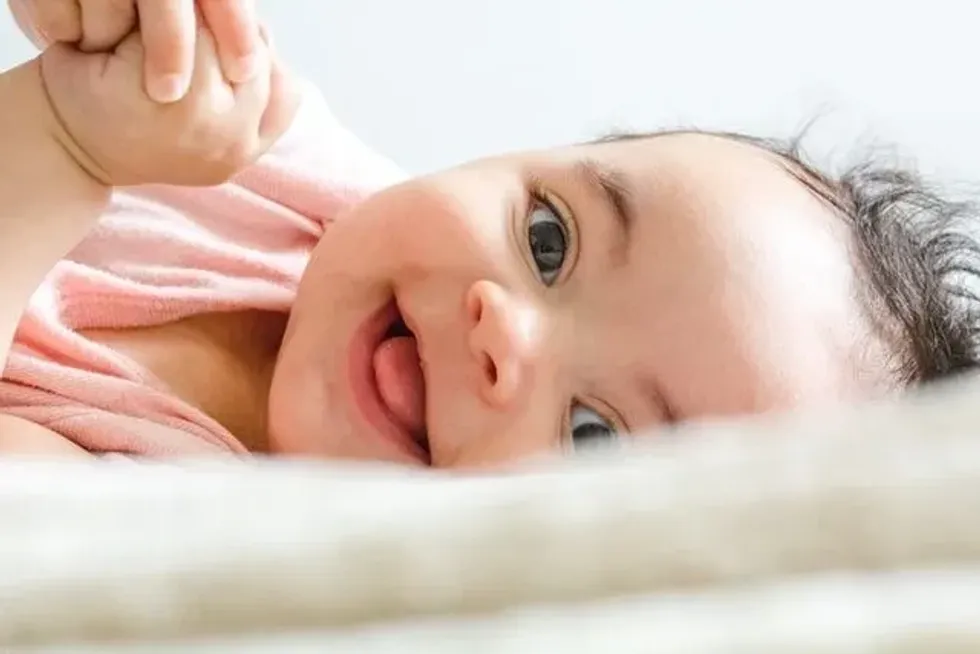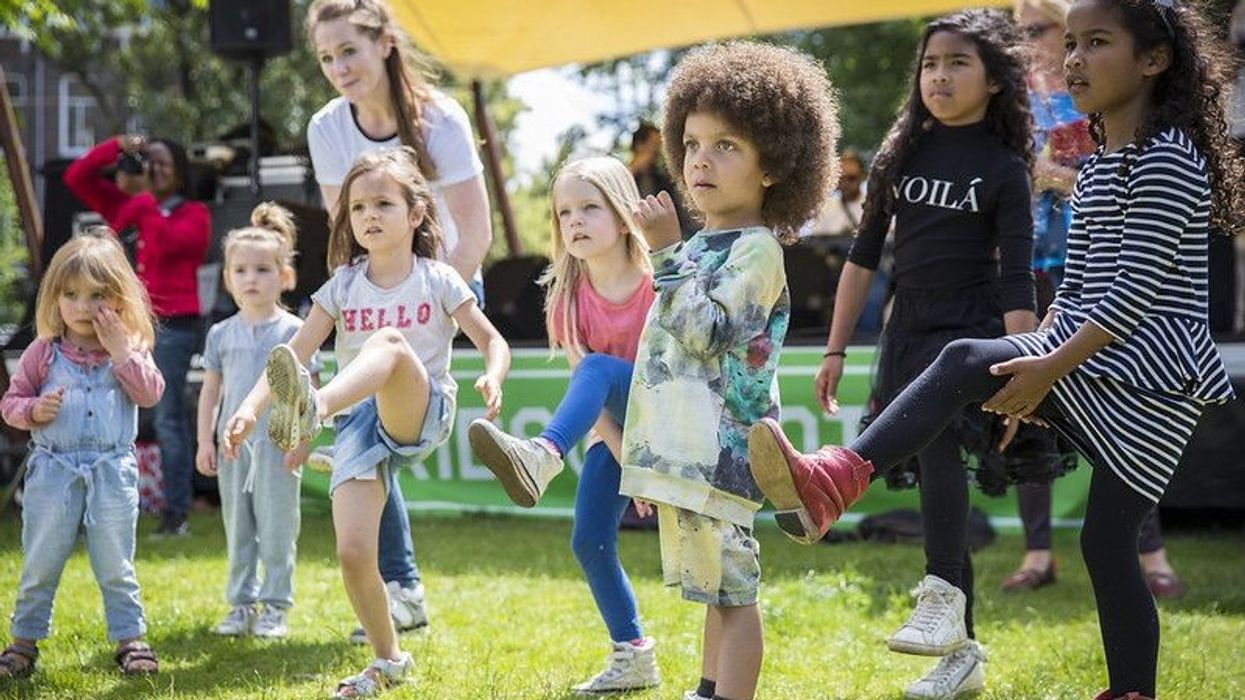Week 11 is here already!
You are now in the penultimate week of the fourth trimester. Your little one is nearly three months old, and pregnancy could be becoming a distant memory.
Your baby is growing and learning at an astounding rate, so what can you expect this week?
Your 11-week-old baby will be showing their personality more and more now, and as their facial features are becoming more pronounced, you could start to recognize yourself and other family members in your little one.
Remember that every child develops at their own pace, and baby developmental milestones are a guideline. Try not to worry if your baby isn't doing certain things yet, but if you do ever have any concerns about your baby's development, don't hesitate to speak to a medical professional.
If you would like to learn more about the coming months with your baby, check out our [15-week-old baby] and [3-month-old schedule] articles too.
Sleep
Your baby will be staying awake for longer periods now, newborns can happily sleep on and off pretty much all day, but your 11-week-old will much more curious about everything else that's going on!
Your baby will be needing around 15 hours of sleep in a 24 hour period now, including naps and it might be a good idea to start getting into a routine with these naps now.
For very young babies, night and day can sometimes get flipped around, but around now your baby might start to settle into more of a routine when it comes to sleeping at night.
They will most likely still need at least two naps a day but these will get shorter as they pick up a few more hours at night.
Babies sometimes experience a sleep regression between 8-12 weeks, so an 11-week-old baby sleep regression could be on the cards, these can be tough but luckily they don't usually last long. As your baby comes through a sleep regression, their new sleeping pattern could be an improvement.
Something else to note at 11 weeks old is that your baby's tiredness cues become much easier to spot. They will start to rub their eyes and ears, stare into space, yawn and grizzle. To avoid overtiredness and getting grumpy, this is the time to let them nap or start the bedtime routine.
Your baby will still need to feed every few hours so is probably still waking up in the night, this is normal. If you keep the lighting low and the atmosphere calm, it's unlikely they will fully wake up, so you can feed them and then both go straight back to sleep.

Food
Your 11-week-old baby is growing rapidly, the average 11-week-old baby weight varies but they will probably have gained at least two to three pounds since their birth weight if not more, and could have already grown three inches taller! You might have already moved them from a Moses basket into a cot.
If you are breastfeeding then you might have noticed your baby becoming more efficient with their intake, eating more in less time. Your body might have had to adjust to a bigger appetite too, a manual silicone breast pump on the side you aren't nursing on is great to catch anything extra.
Bottle-fed babies will also be on a bigger serving of formula now, and you might be surprised at how fast they polish off a bottle!
You may have heard whispers that formula-fed babies are more likely to sleep through the night, but most babies still wake up through the night at this age no matter how they are fed, and some breastfed babies sleep for long stretches too.
There are good things about both methods, whatever works for you and your baby is the best option.
Your baby could be pooping less now, and it's normal for them to go more than a day without pooping at all. As long as they don't seem uncomfortable or constipated when they do go, everything should be fine.
If your baby is steadily gaining weight and is alert and active when awake, then you can pretty much trust that they are getting the amount of nutrition they need. If you have any concerns at all about your baby's food intake or weight, definitely contact your pediatrician or midwife.
Play & Movement

One of the key 11-week-old baby milestones is that they are able to hold onto things, but not only that, whatever they grab is going straight into their mouth!
Infants love to explore things by putting them in their mouths, the action of chewing helps their jaw muscles prepare for solid food, but that doesn't mean they can chew on just anything.
Now is a great time to buy some fun teething style toys, they are also great for baby to practice gripping, and they will love being allowed to gnaw away to their heart's content.
With all the grabbing going on it's really important to keep anything potentially harmful out of your baby's reach, as they get more coordinated you will be shocked how quickly those little hands can swipe something!
As parents we have to be vigilant, soon the reflex of moving things out of the way will come naturally and you will find yourself becoming a pro at spotting hazards anywhere and everywhere.
Tummy time is important at 11 weeks, and you will notice your baby's strength really increasing now as they can hold their head up for longer periods of time. They may even be trying to wiggle their arms to push themselves up, and trying to roll from side to side.
11 weeks is a really fun age, as your baby gets closer to their 3-month milestones you will see all these little aspects of their personality emerging, they will have certain toys and games they like more than others, and respond to you when you initiate play with them.
Communication Skills
One of the most exciting infant milestones is when your baby starts to respond to you, at almost three months old they will start to do this much more confidently, if you chat to them and then pause, they might babble back to you as an answer.
Communication is a key part of the development and before you know it you will be having funny little conversations with your child.
As babies get older they start to cry in different ways to try and communicate different things to you, this is a blessing for parents as those early days trying to read what the cries mean can be stressful!
You may notice your baby has one cry for when they are hungry, and another for if they are uncomfortable or need a diaper change.
It is really important to respond when your baby cries, if a baby is left to cry they will cycle through a range of cries to try and get your attention, and get more and more stressed which can have long-term emotional effects.
Babies at this age can be overstimulated and will need a break after lots of interaction and high-energy activity. If your baby is looking away from you, arching their back, or starting to seem agitated, they are communicating that they need a change of environment.
Your baby is starting to develop their own likes and preferences now, you might find that certain toys, games, songs, and books will get a different reaction and you will soon be able to figure out their favorites.
During pregnancy, your voice was one of the first sounds your baby could hear, and they really like hearing it! Babies love a running commentary, just talking about what you are doing or asking them little rhetorical questions will actually be helping to give your baby a head start on speaking.
Do you read with your baby? Reading is linked to speaking, listening, and writing, all skills your little one will need later on.
Your baby is starting to memorize bits and pieces of language already, and the more words they hear the better. Reading stories together can be a lovely calming activity, and it's been shown that parents who get into this habit early, are more likely to continue to read regularly with their child.
Senses
Although your baby can still only see between eight and 12 inches away from their face at the moment, their attention span is gradually increasing meaning they can focus for longer.
With their eye coordination also improving every day, you will find that by 11 weeks your baby can follow a moving object both left to right and up and down.
Bright and bold colors are easiest for baby to see, so toys, wall hangings, and posters in bright shades for them to look at will really help their developing color vision.
Although it's tempting to go for cute pastel colors, these are much harder for your baby to see right now, so keep this in mind when choosing books and toys.
Babies love faces, they love to see different expressions and they are learning all the time just by looking at you. They also love looking at other babies, including themselves, so a baby-safe mirror is a great toy to add to their play mat, baby gym, or you could even get one for the side of their crib.
Peek-a-boo will also be a huge hit right now, very soon your baby will start to understand object permanence, this is the understanding that things still exist even when you can't directly see or hear them. Peek-a-boo is a really fun way to show them this!
Your baby most likely had a hearing screening before leaving hospital, if your baby was born at home or for some reason you weren't offered this, it's important to get your baby's hearing checked.
By 11 weeks you will probably be able to tell if your baby isn't hearing things, as babies tend to respond to sounds now, especially if they are startled, so if you have concerns do contact your doctor.
Listening to a variety of music styles with your baby is highly beneficial, at this age, they will respond to the different sounds and enjoy dancing around in your arms. Toys like rattles they can grip and make sound with themselves and crinkly sensory toys will help to stimulate their hearing.
Babies love to be cuddled, kissed, and held (they'll let you know if it's too much!). You can let them explore their sense of touch by giving them different things to hold and play with, a soft feather or silky handkerchief, letting them feel the breeze outdoors, and holding them up to feel the grass on their toes.
If you enjoyed reading about 11-week-old baby development, you might find these articles about what to do if your [baby hates tummy time], or if your [baby won't nap] helpful too.










